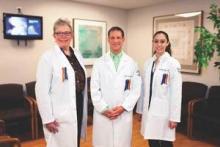The pivotal moment in Dr. David Jaspan’s decision to create an LGBT-friendly practice was when a first-year resident physician told him a lesbian woman had presented with advanced-stage cervical cancer to their Philadelphia-based community ob.gyn. clinic.
“She had health insurance. She lived within walking distance of the clinic,” recalled Dr. Jaspan, chairman of the Einstein Medical Center in Philadelphia.
The patient had been avoiding preventive care, including routine Pap smears, because she feared being judged for her sexuality, he said. “She had access to care, but was afraid to use it. That’s ridiculous. We had to do something.”
In a 2010 survey of nearly 5,000 LGBT (lesbian, gay, bisexual, transgender) individuals nationwide conducted by the LGBT advocacy group Lambda Legal, more than half of the nearly 400 transgender individuals, and nearly 10% of the entire gay, lesbian, and bisexual population surveyed said they believed they would be refused care if they sought it.
An analysis of the literature published in the last 5 years, conducted by Dr. Gloria Bachmann, professor and interim chair of obstetrics and gynecology at the Robert Wood Johnson Medical School in Newark, N.J., and her colleagues, showed that in the ob.gyn. setting, 2% of transgender respondents in one survey reported being physically attacked in a patient waiting area, while nearly 20% of respondents reported being denied care altogether.
Aside from these real or perceived fears of harm or denial, another barrier to care for the LGBT community appears to be a lack of education in the medical training establishment.
A survey published earlier this year in the American Journal of Public Health, and conducted by researchers from the University of California at Los Angeles, showed that of the half of all 138 U.S. academic medical faculty practices currently accredited by the Liaison Committee on Medical Education that responded to the survey, only 10% have standard procedures for connecting patients to LGBT-competent physicians.
The medical community at large seems to be more proactive about inclusion. In 2014, the Human Rights Campaign Foundation designated more than 400 community health care facilities across the country as leaders in LGBT health care equality, more than double the number they designated in 2013.
“I think that things are better than they used to be,” said Dr. Rachel Levine, Pennsylvania’s first transgender physician general.
Dr. Levine was appointed to her post earlier this year by Gov. Tom Wolf (D). “I can’t see someone being refused care because they are LGBT.” Besides, she added, “it’s not ethical.”
While not everyone will practice LGBT medicine, Dr. Levine said, “all medical personnel should have training in, and at least be aware of, the broad outlines of LGBT health issues.” She pointed to a growing number of organizations, such as the Institute of Medicine and the American Medical Association, that also offer guidelines for treating the LGBT population.
Achieving culturally competent care
For Dr. Jaspan, the will and desire to provide care was strong, even though he wasn’t entirely sure how to go about it. “I wondered, What if a man walked into our clinic? But it was clear to me, it doesn’t matter. What matters is that he chose to access care.”
Delivering what is largely referred to by LGBT health experts as “culturally competent care” comes down to two factors: gender neutrality and honesty, according to Dr. Bachmann.
“Unconscious biases find their way into personal and professional interactions, but defining all clinical encounters as gender equal works to eliminate that bias in clinical-patient interactions,” she said.
Gender neutrality helps to establish trust with a transgender patient and makes it easier to get a full history, including details about the surgical and management strategies for the patient’s transition, the difficulties the patient might be having, and how to get the assistance that patient might need, Dr. Bachmann said.
That leads to the second essential element of culturally competent care: honesty.
“[Physicians] don’t have to know everything,” Dr. Bachmann said. “Opening the lines of communication is probably the most important, and acknowledging that you might not have the most in-depth knowledge to meet the [LGBT patient’s] needs, but you do want to take the best care of them, and that you might need their assistance for that.”
Clear communication also helps maintain accurate electronic health records, particularly in the case of transgender patients, said Dr. Levine, who before assuming her role as Pennsylvania’s top physician, was the vice chair for clinical affairs for the department of pediatrics and chief of the division of adolescent medicine and eating disorders at the Penn State Hershey Children’s Hospital at the Penn State Hershey Medical Center.


